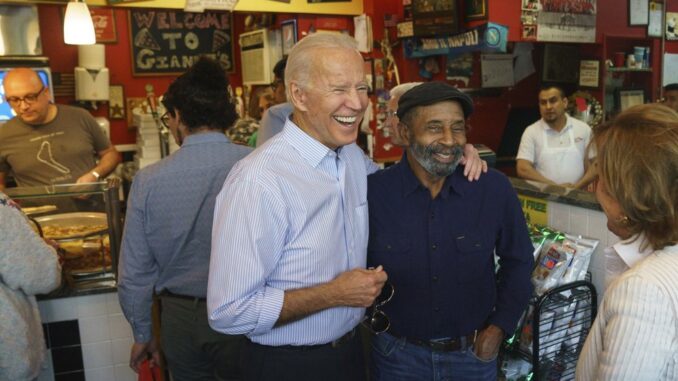
By Stacy M. Brown – “Especially for those moments when this campaign was at its lowest — the African-American community stood up again for me. They always have my back, and I’ll have yours.” — President-elect Joe Biden, Nov. 7, 2020
Black people are sure to remember those remarks that a triumphant President-elect Joe Biden made shortly after taking the stage to celebrate his victory over Republican Donald Trump.
The Democrat emerged from behind a black curtain and made a Barack Obama-like dash to the podium with Bruce Springsteen’s “We Take Care of Our Own” blaring in the Delaware night.
The song represents a symbol of hope but more so for African Americans who have voted for and remained loyal for decades to Democrats despite few tangible gains.
The lyrics, unmistakably succinct, well reflect Black America’s plight:
“Where’re the eyes, the eyes with the will to see
Where’re the hearts that run over with mercy
Where’s the love that has not forsaken me
Where’s the work that’ll set my hands, my soul free
Where’s the spirit that’ll reign over me
Where’s the promise from sea to shining sea?”
Americans — specifically, Black Americans, have chosen to relegate Trump’s toxic legacy to the past.
They’ve chosen to bring about a new government that seeks to unite people rather than divide them and one that more closely reflects the diversity of the American people, offered Neera Tandem, president and CEO of the Center for American Progress in Northwest.
“Voters chose a progressive vision, one that is in favor of a strong and united coronavirus response; an inclusive economy; more affordable and accessible health care; better infrastructure; and climate resilience,” Tandem added. “That more progressive vision also seeks to finally address the bleak history and continuing challenges of racial injustice and inequality.”
Ibram X. Kendi, founding director of the BU Center for Antiracist Research, shared his own assessment.
“I want the love of Black voters right now to transform into the love of Black people,” he said.
For many, that love includes affordable and proportional health care, sufficient coronavirus aid, real economic equity, equal business, banking, loan opportunities and a Department of Justice that will recognize “Black Lives Matter” as much than a slogan.
“I said from the outset I wanted a campaign that represented America, and I think we did that. Now that’s what I want the administration to look like,” Biden remarked during his victory speech at the Chase Center in Wilmington.
It was just nine months earlier, on a relatively cold evening in Charleston, that Biden sat down for a game-changing interview with the Black Press of America.
Trailing badly in the primaries, Biden knew it was South Carolina or bust.
During the interview, conducted by National Newspaper Publishers Association President and CEO Dr. Benjamin F. Chavis Jr. and attended by a gaggle of Black newspaper publishers, Biden pledged his support for a plan for Black America.
He knew that his support of a controversial 1994 crime bill had left a sour taste in the mouths of many African Americans, particularly among Black men. During his interview with Chavis, Biden pledged the kind of sweeping criminal justice reform that’s been considered as long overdue — one that would no long allow for a community which while just 13 percent of the country represents the majority of those incarcerated.
The next day, Biden received a crucial endorsement from South Carolina Congressman Jim Clyburn. The Democrat’s campaign never looked back, taking South Carolina and running up the delegate count to his election as president.
Still, exit polls show that Trump earned more support from Black men in 2020 than in 2016. More Black women also supported the President than they did in 2016, in large part because of the failure of Democrats to reward African Americans for their loyalty and because conditions for Black people in America have grown ever more arduous.
According to NBC News exit polls, Trump claimed about 18 percent of the vote among Black men and 8 percent among Black women, increasing his performance among both groups in 2016.
But Biden held 87 percent of the Black vote, performing better among Black voters than any other demographic group.
The race for the White House was decided in racially diverse urban centers and increasingly diverse suburbs in Pennsylvania, Michigan, Wisconsin, Nevada, Arizona and the district formerly represented by the late Congressman John Lewis in Georgia.
NBC noted that “the Black people who make up 39 percent or more of the population in those areas chose Biden, with some exceptions.
“Once the vote counts from Philadelphia, Detroit, Milwaukee and Atlanta started to near completion, Trump’s lead in their respective states disappeared. Biden — who would not have been the Democratic presidential nominee without Black voters in South Carolina — reached 270 Electoral College votes in large part because of Black voters in these cities,” NBC reported.
“I will be honored to be serving with a fantastic vice president in Kamala Harris, who will make history as the first woman, first Black woman, first woman of South Asian descent and first daughter of immigrants ever elected to national office in this country,” Biden declared.
“It’s long overdue, and we’re reminded tonight of all those who fought so hard for so many years to make this happen. But once again, America has bent the arc of the moral universe towards justice,” he said.

Be the first to comment